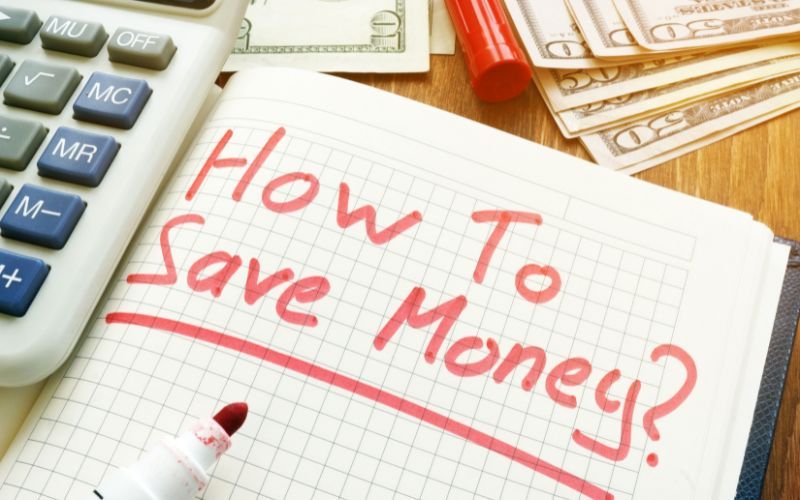Last Updated: April 2, 2024
Learn to maximize earnings and minimize spending

Disclaimer: We are not qualified legal or tax professionals and are not giving advice. Always speak with a qualified professional before making any legal or financial decisions.
Embarking on a financial journey in 2023? Look no further! Our Ultimate Guide to Saving Money unveils the most effective strategies to not only bolster your savings but to ensure your financial growth.
From practical budgeting tips to innovative saving hacks, we've distilled everything you need into an easy-to-follow roadmap. Whether you're navigating through unexpected expenses or aiming for long-term wealth building, our guide is your compass to financial resilience and prosperity
Ready to move forward? Click here for an immediate, free consultation with a debt specialist.
Create a budget and stick to it!
Budgeting gives many people headaches. In reality, budgeting can be simple. It is understanding where your money comes from and where you spend it. You can choose the budgeting method that works for you and helps you save money.
In a zero-based budget, you divide all your income into three categories. These are wants and needs, short and long-term savings goals, and debt payments. The income and outgo should be zero at the end of each month. This type of budget aims to help you meet your financial goals.
Step One to Save Money
To start this budget, you must first know how much you must spend. This could be from paychecks, benefits, or other sources of monthly income. If your income varies, try using either an average income (add up several months and then divide by the number of months for an average) or the lowest amount you have over several months.
Step Two to Save Money
Next, you need to know where you are spending your money. Track every penny you spend for several months. Divide your expenses into categories and look for places to cut monthly expenditures.
Next, determine which categories are a want and a need. What is the difference? A need is something you must have to survive. The basics are food, water (utilities), and shelter - living expenses. Then you need clothes, health care, and transportation.
A want is something that makes your life better. If you are unsure if it is a want or need, ask if you can go 24 hours without it. If you can, it is a want. This takes some personal honesty.
A savings account really is a need that most people do not have. Having an account for long-term and short-term spending will let you not rely on credit cards for emergencies, and you can plan for larger expenses like car tires. Figure out a reasonable savings goal - especially considering annual bills like property taxes.
According to a recent article from Forbes, only 44% of Americans can afford a $1000 emergency expense.
Step Three to Save Money
Now, divvy up your income. Most of it should go to your needs - usually as monthly bills. Some should go toward wants and some toward savings and debt payoff. If the sum at the end is not zero, you need to cut some expenses. Start with wants and cut out most of those. Then examine your needs. Is there anything you can realistically cut to decrease your expenses?
If you have extra money, put it into savings.
You now have a monthly budget and will hopefully be able to meet your financial goals. This is not about deprivation. This is about ensuring that you have a financial future and that anything you give up will hopefully be short-term. Getting behind on your monthly bills can ruin your financial goals.
Luckily, there are tons of budget planners available online. Find out some of the best FREE budget planners to use.
Best Ways to Save Money Fast
Here are some proven ways to save money.
Cut back on eating out - pack your lunch and snacks
It's no surprise that people enjoy eating out at restaurants. Someone else does all the work, and you sit back and enjoy eating it! Sounds like a win-win, right? Not so much.
Buying lunch every day is also extremely expensive. Instead of eating out, make a point of grocery shopping and eating at home. Sure, food is expensive right now. Once it goes through the restaurant prep and serving costs, it gets even more expensive.
Learn how to be more efficient about grocery shopping by reading how to create the perfect grocery budget.
Pack your lunches and snacks at home. If it works into your budget, eat out once a week or once a month. This goes for coffee shop visits as well!
Cancel unused subscriptions - gym memberships, cable, magazines, streaming services, etc.
Most of us have a bunch of pesky unused subscriptions that have been created over the years. Cancel them or use a subscription service or app to cancel them, like Rockey Money.
If you have every streaming service available, ask if you need each and cut out a few or rotate through them.
During the pandemic, we learned that the internet is not just a luxury. Look for the most cost-effective internet service. Look for a better cell phone plan, and remember you do not need the latest phone!
Invest in energy-efficient appliances and LED light bulbs
Sounds woke, right? Nope. This is just plain smart. An electric stove uses between 1,000 and 3,000 watts, and an oven uses 2,000 to 5,000. If you use your stove and oven for an hour a day, the least energy-efficient appliances will cost you 129 cents for that hour. The energy-efficient ones will cost 48 cents. Over the course of a year, that adds up ($470 or $175).
The same can be said for LED bulbs. They might be more expensive but last longer and use less energy, lowering energy costs.
Other ways to save on electric or utility bills include insulating doors, windows, and attic spaces. Even a small effort can pay off in savings. Save money by installing a smart thermostat or an automatic one to reduce heating and cooling costs.
Automate your savings
To meet your savings goal, once you know how much money you have to put into a savings account, have your payroll department directly deposit a percentage into a savings account before you even see it.
Alternatively, you can transfer the money as soon as it is deposited into your checking account.
Remember that you can have separate savings accounts for an emergency fund and short-term and long-term savings goals.
This automatic savings plan will allow you to build an emergency fund and meet your short and long-term goals. Once you get more than $1000 in your savings account, transfer the extra to a high-yield savings account.
Shop smart
Dabbling in the dark art of impulse shopping can be hazardous to our financial health, yet its allure is so tempting we often succumb and seek instant gratification. And your credit card debt grows and grows.
Instead, shop around to find big savings and a better deal and buy when you can pay cash for the item, if possible. Remember that shopping online can increase the item's price as cookies track your visits.
Join loyalty programs and consider online shopping. You give up privacy in terms of purchasing habits, but these programs can save money.
Invest in yourself
Investing in yourself means that you find ways to change your future. This could be through education, vocational tech learning, certification, or other ways to improve your income potential.
Along with investing in yourself, invest in your children through savings for a child's education. There are ways to set money aside without tax penalties.
Over 18 years, a little set aside each month can grow into a decent college or vocational tech education.
If you have an employer match for education or retirement, take full advantage of that opportunity.
Be mindful of your habits - spend money wisely
Part of budgeting is seeing where your money is going. Spending mindfully and avoiding impulse purchases can help save money fast.
Consider a spending freeze for up to 30 days. This means you spend no money, giving you a month to reset your habits. You do need to pay your monthly bills!
Live below your means
We are sold a certain lifestyle through the media. This lifestyle is frankly beyond most people's means - even those with decent jobs. Instead of "trying to keep up with the Joneses'" live within your means.
This might mean not having the newest fashions or living in a less impressive house or apartment.
If these are actual needs, you may need to cut other expenditures to live within your means.
Other Money-Saving Tips
There are many penny-pinching websites out there you can learn from. They will suggest money-saving tips like coupon codes, free admission, buying cleaning supplies at big box stores or online, and similar tips.
These do work! As with loyalty programs, you give up some privacy but save money in the end.
Look for ways to earn extra cash
A lot of people suggest getting another job. What if you are already working two or more? Look for other ways to earn money.
This might be selling unused items and putting that money into savings.
FAQs
Our Final Thoughts
If you’re serious about ways to save money and build wealth in 2023, then put these strategies into action. And if you need help with your debt, we’re here for you.
Get a free consultation with one of our financial experts today and start on your savings journey to make your dreams of financial freedom a reality.
*Disclaimer: Pacific Debt Relief explicitly states that it is not a credit repair organization, and its program does not aim to improve individuals' credit scores. The information provided here is intended solely for educational purposes, aiding consumers in making informed decisions regarding credit and debt matters. The content does not constitute legal or financial advice. Pacific Debt Relief strongly advises individuals to seek the counsel of qualified professionals before undertaking any legal or financial actions.
✔ Accredited by Better Business Bureau with BBB A+ rating (4.93 rating and 1678 reviews)
✔ US News and World Reports and Bankrate ranked Pacific Debt Relief as one of “The Best Debt Relief Companies of 2024”
✔ 6.9 star rating by BestCompany.com (over 2379 client reviews)
✔ 4.8 star rating by TrustPilot based (over 1613 verified consumer reviews)
✔ ConsumerAffairs.com Accredited (over 544 verified reviews with an average rating of 5 stars)
✔ A Top 10 Rated Compan by TopTenReviews.com , ConsumersAdvocate.com and Top10debtconsolidation.com
✔ 4.6 star rating by Google (229 client reviews)
✔ 100% rating by SuperMoney (9 client reviews)
Reduce Your Credit Card Debt By Up to Half

BBB Reviews | 4.9/5.0 Rating









 Do Not Sell My Personal Information
Do Not Sell My Personal Information